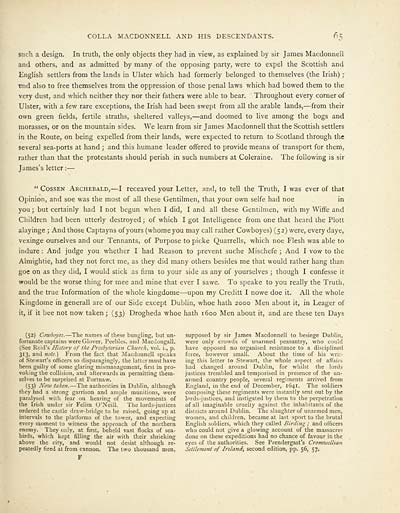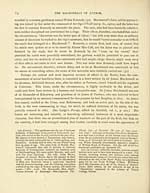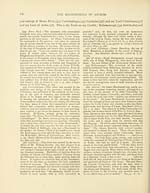Historical account of the Macdonnells of Antrim
(79) Page 65
Download files
Complete book:
Individual page:
Thumbnail gallery: Grid view | List view

COLLA MACDONNELL AND HIS DESCENDANTS. t>5
such a design. In truth, the only objects they had in view, as explained by sir James Macdonnell
and others, and as admitted by many of the opposing party, were to expel the Scottish and
English settlers from the lands in Ulster which had formerly belonged to themselves (the Irish) ;
■end also to free themselves from the oppression of those penal laws which had bowed them to the
very dust, and which neither they nor their fathers were able to bear. Throughout every corner of
Ulster, with a few rare exceptions, the Irish had been swept from all the arable lands, — from their
own green fields, fertile straths, sheltered valleys, — and doomed to live among the bogs and
morasses, or on the mountain sides. We learn from sir James Macdonnell that the Scottish settlers
in the Route, on being expelled from their lands, were expected to return to Scotland through the
several sea-ports at hand ; and this humane leader offered to provide means of transport for them,
rather than that the protestants should perish in such numbers at Coleraine. The following is sir
James's letter : —
" Cossen Archebald, — I receaved your Letter, and, to tell the Truth, I was ever of that
Opinion, and soe was the most of all these Gentilmen, thai your own selfe had noe in
you; but certainly had I not begun when I did, I and all these Gentilmen, with my Wiffe and
Children had been utterly destroyed; of which I got Intelligence from one that heard the Plott
alayinge ; And those Captayns of yours (whomeyou may call rather Cowboyes) (52) were, every daye,
vexinge ourselves and our Tennants, of Purpose to picke Quarrells, which noe Flesh was able to
indure : And judge you whether I had Reason to prevent suche Mischefe ; And I vow to the
Almightie, had they not forct me, as they did many others besides me that would rather hang than
goe on as they did, I would stick as firm to your side as any of yourselves ; though I confesse it
would be the worse thing for mee and mine that ever I sawe. To speake to you really the Truth,
and the true Information of the whole kingdome — upon my Creditt I nowe doe it. All the whole
Kingdome in generall are of our Side except Dublin, whoe hath 2000 Men about it, in Leager of
it, if it bee not now taken ; (53) Drogheda whoe hath 1600 Men about it, and are these ten Days
(52) Cowboyes. — The names of these bungling, but un- supposed by sir James Macdonnell to besiege Dublin,
fortunate captains were Glover, Peebles, and Macdougall. were only crowds of unarmed peasantry, who could
(See Reid's History of the Presbyterian Church, vol. i., p. have opposed no organised resistance to a disciplined
313, and note.) From the fact that Macdonnell speaks force, however small. About the time of his writ-
of Stewart's officers so disparagingly, the latter must have ing this letter to Stewart, the whole aspect of affairs
been guilty of some glaring mismanagement, first in pro- had changed around Dublin, for whilst the lords
voking the collision, and afterwards in permitting them- justices trembled and temporised in presence of the un-
selves to be surprised at Portnaw. armed country people, several regiments arrived from
(53) Now taken. — The authorities in Dublin, although England, in the end of December, 1641. The soldiers
they had a strong garrison and ample munitions, were composing these regiments were instantly sent out by the
paralysed with fear on hearing of the movements of lords-justices, and instigated by them to the perpetration
the Irish under sir Felim O'Neill. The lords-justices of all imaginable cruelty against the inhabitants of the
ordered the castle draw-bridge to be raised, going up at districts around Dublin. The slaughter of unarmed men,
intervals to the platforms of the tower, and expecting women, and children, became at last sport to the brutal
every moment to witness the approach of the northern English soldiers, which they called Birding ; and officers
enemy. They only, at first, beheld vast flocks of sea- who could not give a glowing account of the massacres
birds, which kept filling the air with their shrieking done on these expeditions had no chance of favour in the
above the city, and would not desist although re- eyes of the authorities. See Prendergast's Cromwellian
peatedly fired at from cannon. The two thousand men, Settlement of Ireland, second edition, pp. 56, 57.
such a design. In truth, the only objects they had in view, as explained by sir James Macdonnell
and others, and as admitted by many of the opposing party, were to expel the Scottish and
English settlers from the lands in Ulster which had formerly belonged to themselves (the Irish) ;
■end also to free themselves from the oppression of those penal laws which had bowed them to the
very dust, and which neither they nor their fathers were able to bear. Throughout every corner of
Ulster, with a few rare exceptions, the Irish had been swept from all the arable lands, — from their
own green fields, fertile straths, sheltered valleys, — and doomed to live among the bogs and
morasses, or on the mountain sides. We learn from sir James Macdonnell that the Scottish settlers
in the Route, on being expelled from their lands, were expected to return to Scotland through the
several sea-ports at hand ; and this humane leader offered to provide means of transport for them,
rather than that the protestants should perish in such numbers at Coleraine. The following is sir
James's letter : —
" Cossen Archebald, — I receaved your Letter, and, to tell the Truth, I was ever of that
Opinion, and soe was the most of all these Gentilmen, thai your own selfe had noe in
you; but certainly had I not begun when I did, I and all these Gentilmen, with my Wiffe and
Children had been utterly destroyed; of which I got Intelligence from one that heard the Plott
alayinge ; And those Captayns of yours (whomeyou may call rather Cowboyes) (52) were, every daye,
vexinge ourselves and our Tennants, of Purpose to picke Quarrells, which noe Flesh was able to
indure : And judge you whether I had Reason to prevent suche Mischefe ; And I vow to the
Almightie, had they not forct me, as they did many others besides me that would rather hang than
goe on as they did, I would stick as firm to your side as any of yourselves ; though I confesse it
would be the worse thing for mee and mine that ever I sawe. To speake to you really the Truth,
and the true Information of the whole kingdome — upon my Creditt I nowe doe it. All the whole
Kingdome in generall are of our Side except Dublin, whoe hath 2000 Men about it, in Leager of
it, if it bee not now taken ; (53) Drogheda whoe hath 1600 Men about it, and are these ten Days
(52) Cowboyes. — The names of these bungling, but un- supposed by sir James Macdonnell to besiege Dublin,
fortunate captains were Glover, Peebles, and Macdougall. were only crowds of unarmed peasantry, who could
(See Reid's History of the Presbyterian Church, vol. i., p. have opposed no organised resistance to a disciplined
313, and note.) From the fact that Macdonnell speaks force, however small. About the time of his writ-
of Stewart's officers so disparagingly, the latter must have ing this letter to Stewart, the whole aspect of affairs
been guilty of some glaring mismanagement, first in pro- had changed around Dublin, for whilst the lords
voking the collision, and afterwards in permitting them- justices trembled and temporised in presence of the un-
selves to be surprised at Portnaw. armed country people, several regiments arrived from
(53) Now taken. — The authorities in Dublin, although England, in the end of December, 1641. The soldiers
they had a strong garrison and ample munitions, were composing these regiments were instantly sent out by the
paralysed with fear on hearing of the movements of lords-justices, and instigated by them to the perpetration
the Irish under sir Felim O'Neill. The lords-justices of all imaginable cruelty against the inhabitants of the
ordered the castle draw-bridge to be raised, going up at districts around Dublin. The slaughter of unarmed men,
intervals to the platforms of the tower, and expecting women, and children, became at last sport to the brutal
every moment to witness the approach of the northern English soldiers, which they called Birding ; and officers
enemy. They only, at first, beheld vast flocks of sea- who could not give a glowing account of the massacres
birds, which kept filling the air with their shrieking done on these expeditions had no chance of favour in the
above the city, and would not desist although re- eyes of the authorities. See Prendergast's Cromwellian
peatedly fired at from cannon. The two thousand men, Settlement of Ireland, second edition, pp. 56, 57.
Set display mode to:
![]() Universal Viewer |
Universal Viewer | ![]() Mirador |
Large image | Transcription
Mirador |
Large image | Transcription
Images and transcriptions on this page, including medium image downloads, may be used under the Creative Commons Attribution 4.0 International Licence unless otherwise stated. ![]()
| Histories of Scottish families > Historical account of the Macdonnells of Antrim > (79) Page 65 |
|---|
| Permanent URL | https://digital.nls.uk/95342195 |
|---|
| Description | A selection of almost 400 printed items relating to the history of Scottish families, mostly dating from the 19th and early 20th centuries. Includes memoirs, genealogies and clan histories, with a few produced by emigrant families. The earliest family history goes back to AD 916. |
|---|

